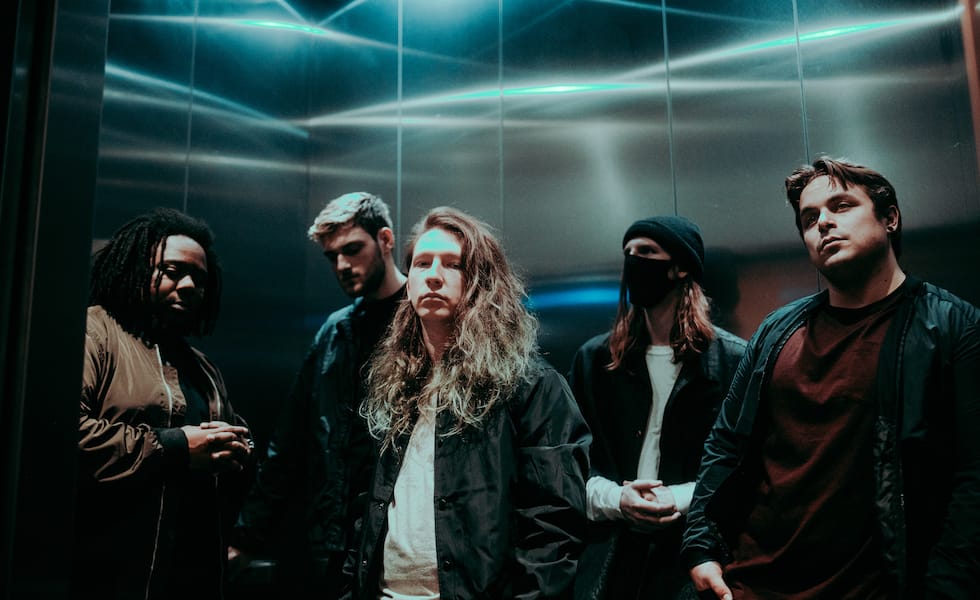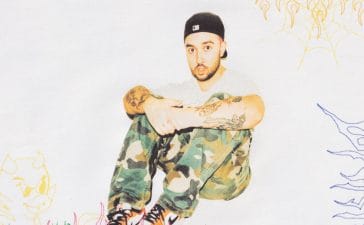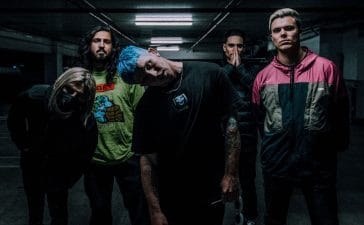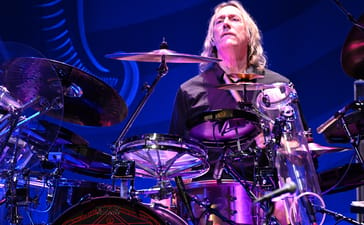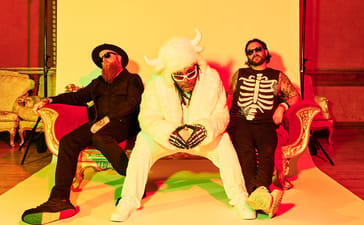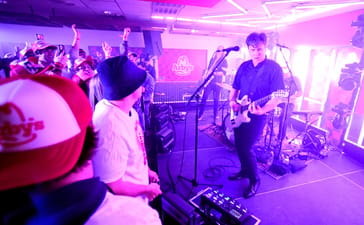At face value, Alias – the bold and blistering second album by the Michigan-native moshlords in Sleep Waker – is a truly riveting affair; it’s polarising in the best ways, fusing a distinctly raw, visceral and incandescent surge of authentic human emotion with spot-shined production and soundscapes meticulously crafted for maximum impact.
The five-piece have found away to make silvery, glitch-inflected metalcore sound more natural than most DIY punk bands recording on stolen tape recorders. We can see why UNFD have jumped on their hype train by that virtue alone.
But scratching away the album’s sonically adventurous veneer, we unearth a striking palate of thematic intensity. A press release says that Alias “asks listeners to examine who we are, how we quantify our reality, and what it means to be alive” – but those kinds of copy are always at least a little exaggerated (take it from us, they’re how we make a living), so when we first hit play, we didn’t expect to be so viciously slapped in the face with an existential crisis.
The album – and really, the band itself – is rooted in the deeply turbulent relationships that songwriters Hunter Courtright (vocals) and Frankie Mish (drums) have with sleep. They both suffer from insomnia and sleep paralysis, and bonded over such in the band’s infancy. Twining their ruminations of as much with themes of grief, dysphoria, angst and trauma, Alias essentially boils down to 30 minutes of unrestrained catharsis, spun through a web of tearing riffs, scorching yells and wall-rattling drum fills.
BLUNT caught up with Courtright and Mish to explore the way Alias marks a striking leap into new territory for Sleep Walker, why UNFD was the label for it, how they use their art to reckon with their trauma, and how they manage to stay awake onstage.
How did you want this record to really take Sleep Waker to the next level?
Mish: We wanted to just restart, I think. As we were writing, we were like, “Let’s do a few callbacks to old Sleep Waker stuff, but take it in a new direction. One of the tracks in this is called ‘Cold Moon’ and it’s kind of like, “Alright, Don’t Look At The Moon was a thing, but we’re moving past that – this is the new stuff. It’s colder now.”
Courtright: We’re still 100 percent Sleep Waker, but [Alias] is a new platform that we’re going to build from. What you hear in this record is the beginning of what the new Sleep Waker is going to be, I would say. And we’re just beginning to flesh out what it is.
Mish: Yeah, we’re starting to take ourselves more seriously as artists, rather than just band kids that were like, “Dude, heavy riffs are fun!” This is more like, “Okay yeah, riffs are fun, but let’s make something super creative with them. Let’s actually dig right in and make something personal – something more than just riffs and angry noises.”
Congratulations on joining the UNFD family! What’s that been like for you guys?
Courtright: It’s been awesome. So many of the bands that we all love are on there, and a lot of hard work was put into it, so it feels really good.
Mish: I’d been in calls with a bunch of different labels, just talking and figuring stuff out, seeing what we could do with them – all that stuff. And it had been a bit of a chore, y’know? But this was like… We got into the call [with the team at UNFD] and we just immediately clicked. We got off the call and I was like, “Honestly, they’re the only label I want to work with now.” When we were talking as a band, originally, I was like, “I don’t know about labels.” I mean, I was totally open to it, absolutely. I have nothing wrong with record labels or how they operate, but I didn’t know if that was the right path for us. But as soon as we had that call, I was like, “Yeah, I want to push for UNFD.”
One thing that makes Alias such a powerful record is how authentically you approach some real heavy, sobering themes. That obviously comes down to how this band serves as an outlet for your personal afflictions – ‘Distance’ for example, being about Hunter losing his grandfather to dementia. How do you find that channelling your emotional weight into music helps you reckon with it?
Courtright: It’s very much a form of catharsis. The inspiration for ‘Distance’ obviously came from a very natural place, and I think that’s because I find it so much easier to write about things I’ve experienced or felt that I am, in some way, personally in touch with.
Mish: This whole band is pretty much based on our experiences with insomnia, sleep paralysis… Don’t Look At The Moon was a whole story about sleep paralysis and trauma, and we didn’t necessarily draw all of that from personal experience – but anything that didn’t come from us was still based on the experiences from others. I think the whole band just likes going off actual emotion. ‘Distance’ is about Hunter’s grandfather, ‘Relief’ is about my grandfather, ‘Breathing’ is about a close friend of an old band member’s… There’s lots of very emotional, really tough subjects, and we try and put them in a way that isn’t…
Courtright: It’s not exposing that directly, or in an extreme manner, but it covers it in a way that people understand.
Mish: Yeah. We don’t necessarily want to have to put a trigger warning in front of our songs or anything like that, so we have to ask our selves, “How do we push this narrative with an artistic vision?
Well, it’s not like you’re writing songs about these long–since–passed experiences. You’re still in the thick of it all, and you’re reckoning with these traumas as you go. When you’re working through something in realtime and pouring it into your art, do you find it easier to figure out where you are on the journey, and where to head next on it?
Courtright: I definitely think it’s a good way to process things. It’s almost like a resolve – when a song is done, that’s where that story ends. Like how ‘Distance’ is about my past and my grandfather: that’s cemented in stone. He’s gone now. That song kind of serves as the ending of that chapter for me.
I’m curious about how that links back to this band being about sleep – why is that such a poignant topic for you?
Mish: I had a lot of issues with sleep when I was younger. ‘Melatonin’ for example – that song is about me being young and having nightmares from taking melatonin. I would have these horrible nightmares where I was trapped. You know those ones where you’re running from something, but you’re not able to actually move? That’s what it gave me. And I still get stuff like that when I take melatonin regularly. Sleep paralysis is definitely a big part of touring, too.
That’s where reading your press bio got me, because I have a couple sleep-related issues myself, and I’m lucky in that I work full-time from home, so my schedule is as flexible as it possibly can be. But if I’ve had a particularly brutal night, I am just fucked the next day. How does that go when you’re in a touring band and you have all these super important commitments to work around?
Mish: I’m pretty much the ‘band dad’, so I’m always running all over the place, constantly doing stuff. And then on top of that, I’m the night driver, so depending on the show, I’m staying up four to five hours every night after a stop, going to bed at 5am, 8am, whatever – then the next guy wakes up and takes over, and I sleep until we get to the venue at midday. So I’m only getting four or five hours of sleep – and eventually, near the end of the tour, there’s that moment where your body catches up with you and you realise how you’ve been running on fumes the whole time. But I love touring. The experience is great, I would never trade it for anything, and I’m so excited to get back to it… But yeah, the body fatigue is real.


